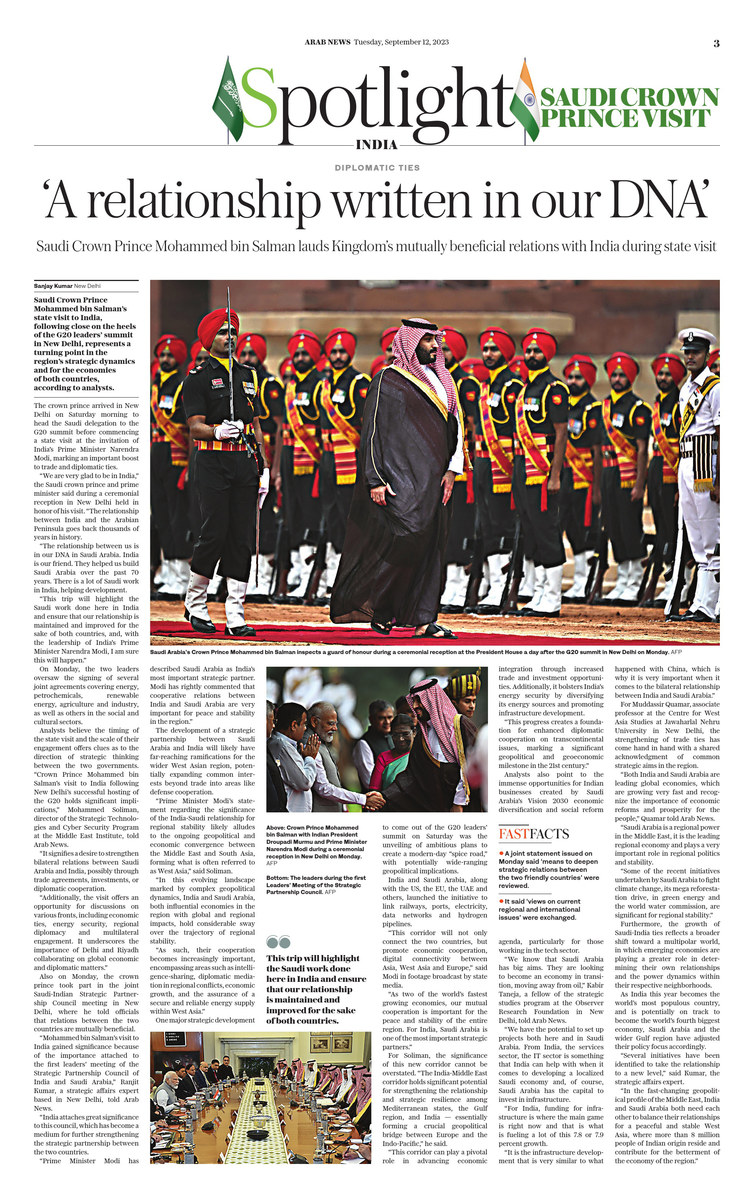NEW DELHI: Saudi Crown Prince Mohammed bin Salman’s state visit to India, following close on the heels of the G20 leaders’ summit in New Delhi, represents a turning point in the region’s strategic dynamics and for the economies of both countries, according to analysts.
The crown prince arrived in New Delhi on Saturday morning to head the Saudi delegation to the G20 summit before commencing a state visit at the invitation of India’s Prime Minister Narendra Modi, marking an important boost to trade and diplomatic ties.
“We are very glad to be in India,” the Saudi crown prince and prime minister said during a ceremonial reception in New Delhi held in honor of his visit. “The relationship between India and the Arabian Peninsula goes back thousands of years in history.
“The relationship between us is in our DNA in Saudi Arabia. India is our friend. They helped us build Saudi Arabia over the past 70 years. There is a lot of Saudi work in India, helping development.
“This trip will highlight the Saudi work done here in India and ensure that our relationship is maintained and improved for the sake of both countries, and, with the leadership of India’s Prime Minister Narendra Modi, I am sure this will happen.”
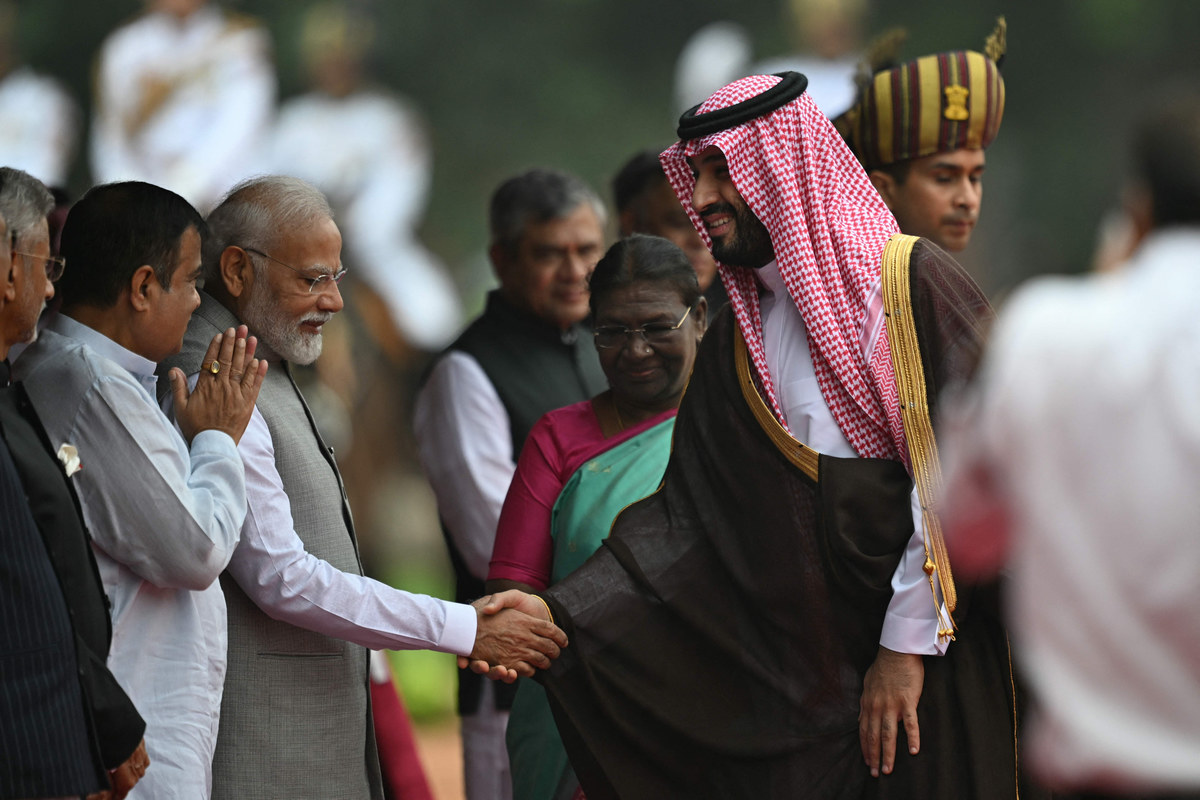
Indian President Droupadi Murmu (3R) looks on as India’s Prime Minister Narendra Modi (3L) and his Saudi Arabian counterpart and Crown Prince Mohammed bin Salman (2R) shake hands during a ceremonial reception at the President House a day after the G20 summit in New Delhi on September 11, 2023. (AFP)
On Monday, the two leaders oversaw the signing of several joint agreements covering energy, petrochemicals, renewable energy, agriculture and industry, as well as others in the social and cultural sectors.
Analysts believe the timing of the state visit and the scale of their engagement offers clues as to the direction of strategic thinking between the two governments. “Crown Prince Mohammed bin Salman’s visit to India following New Delhi’s successful hosting of the G20 holds significant implications,” Mohammed Soliman, director of the Strategic Technologies and Cyber Security Program at the Middle East Institute, told Arab News.
“It signifies a desire to strengthen bilateral relations between Saudi Arabia and India, possibly through trade agreements, investments, or diplomatic cooperation.
“Additionally, the visit offers an opportunity for discussions on various fronts, including economic ties, energy security, regional diplomacy and multilateral engagement. It underscores the importance of Delhi and Riyadh collaborating on global economic and diplomatic matters.”
FASTFACTS
- A joint statement issued on Monday said “means to deepen strategic relations between the two friendly countries” were reviewed.
- It said “views on current regional and international issues” were exchanged.
- It added that “the importance of enhancing cooperation in areas that aim to advance the economic partnership between the two countries” was stressed.
Also on Monday, the crown prince took part in the joint Saudi-Indian Strategic Partnership Council meeting in New Delhi, where he told officials that relations between the two countries are mutually beneficial.
“Mohammed bin Salman’s visit to India gained significance because of the importance attached to the first leaders’ meeting of the Strategic Partnership Council of India and Saudi Arabia,” Ranjit Kumar, a strategic affairs expert based in New Delhi, told Arab News.
“India attaches great significance to this council, which has become a medium for further strengthening the strategic partnership between the two countries.
“Prime Minister Modi has described Saudi Arabia as India’s most important strategic partner. Modi has rightly commented that cooperative relations between India and Saudi Arabia are very important for peace and stability in the region.”

Indian Prime Minister Narendra Modi and Saudi Crown Prince Mohammed bin Salman held the first Leaders’ Meeting of the Strategic Partnership Council. (Indian Ministry of External Affairs)
The development of a strategic partnership between Saudi Arabia and India will likely have far-reaching ramifications for the wider West Asian region, potentially expanding common interests beyond trade into areas like defense cooperation.
“Prime Minister Modi’s statement regarding the significance of the India-Saudi relationship for regional stability likely alludes to the ongoing geopolitical and economic convergence between the Middle East and South Asia, forming what is often referred to as West Asia,” said Soliman.
“In this evolving landscape marked by complex geopolitical dynamics, India and Saudi Arabia, both influential economies in the region with global and regional impacts, hold considerable sway over the trajectory of regional stability.
“As such, their cooperation becomes increasingly important, encompassing areas such as intelligence-sharing, diplomatic mediation in regional conflicts, economic growth, and the assurance of a secure and reliable energy supply within West Asia.”
One major strategic development to come out of the G20 leaders’ summit on Saturday was the unveiling of ambitious plans to create a modern-day “spice road,” with potentially wide-ranging geopolitical implications.
India and Saudi Arabia, along with the US, the EU, the UAE and others, launched the initiative to link railways, ports, electricity, data networks and hydrogen pipelines.
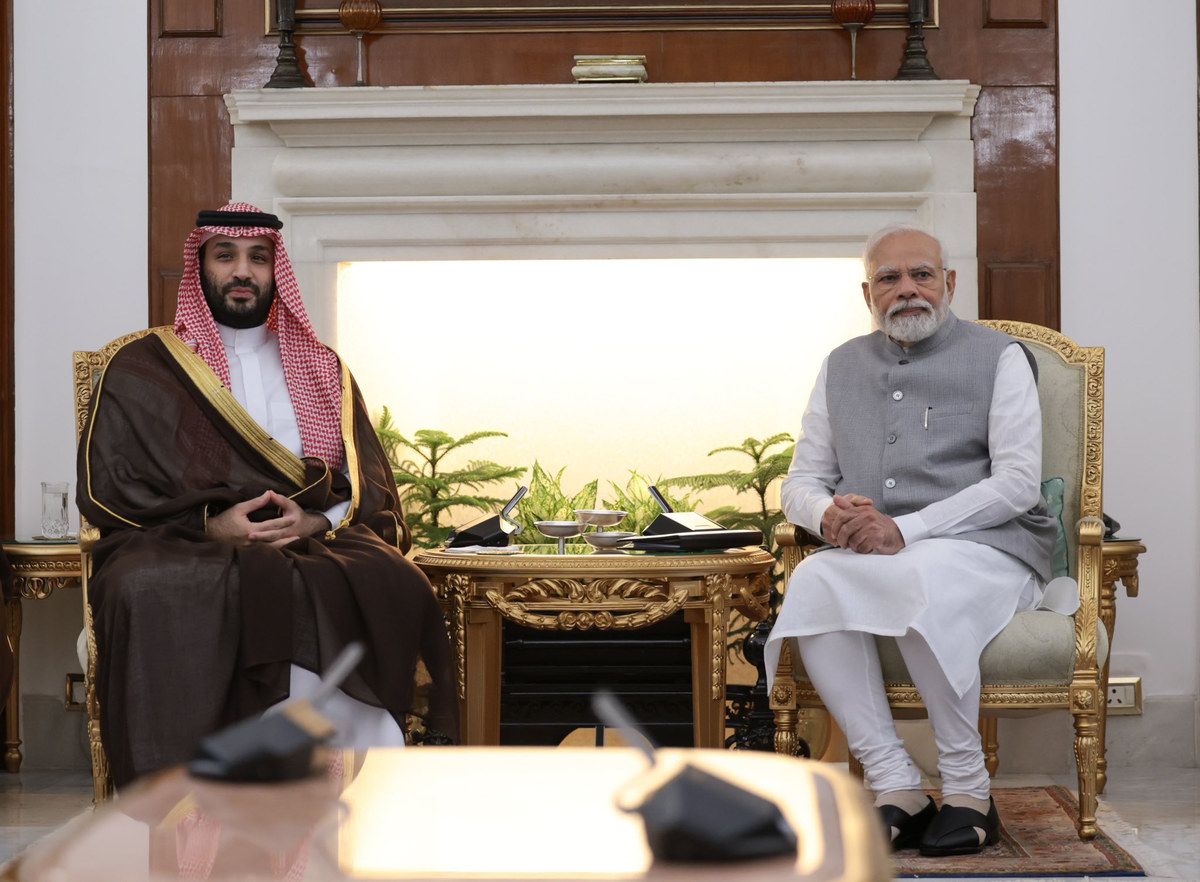
Saudi Crown Prince Mohammed bin Salman, left, with Indian Prime Minister Narendra Modi in New Delhi on Monday.(Indian Ministry of External Affairs)
“This corridor will not only connect the two countries, but promote economic cooperation, digital connectivity between Asia, West Asia and Europe,” said Modi in footage broadcast by state media.
“As two of the world’s fastest growing economies, our mutual cooperation is important for the peace and stability of the entire region. For India, Saudi Arabia is one of the most important strategic partners.”
For Soliman, the significance of this new corridor cannot be overstated. “The India-Middle East corridor holds significant potential for strengthening the relationship and strategic resilience among Mediterranean states, the Gulf region, and India — essentially forming a crucial geopolitical bridge between Europe and the Indo-Pacific,” he said.
“This corridor can play a pivotal role in advancing economic integration through increased trade and investment opportunities. Additionally, it bolsters India’s energy security by diversifying its energy sources and promoting infrastructure development.
“This progress creates a foundation for enhanced diplomatic cooperation on transcontinental issues, marking a significant geopolitical and geoeconomic milestone in the 21st century.”
Analysts also point to the immense opportunities for Indian businesses created by Saudi Arabia’s Vision 2030 economic diversification and social reform agenda, particularly for those working in the tech sector.
“We know that Saudi Arabia has big aims. They are looking to become an economy in transition, moving away from oil,” Kabir Taneja, a fellow of the strategic studies program at the Observer Research Foundation in New Delhi, told Arab News.
“We have the potential to set up projects both here and in Saudi Arabia. From India, the services sector, the IT sector is something that India can help with when it comes to developing a localized Saudi economy and, of course, Saudi Arabia has the capital to invest in infrastructure.
“For India, funding for infrastructure is where the main game is right now and that is what is fueling a lot of this 7.8 or 7.9 percent growth.
“It is the infrastructure development that is very similar to what happened with China, which is why it is very important when it comes to the bilateral relationship between India and Saudi Arabia.”
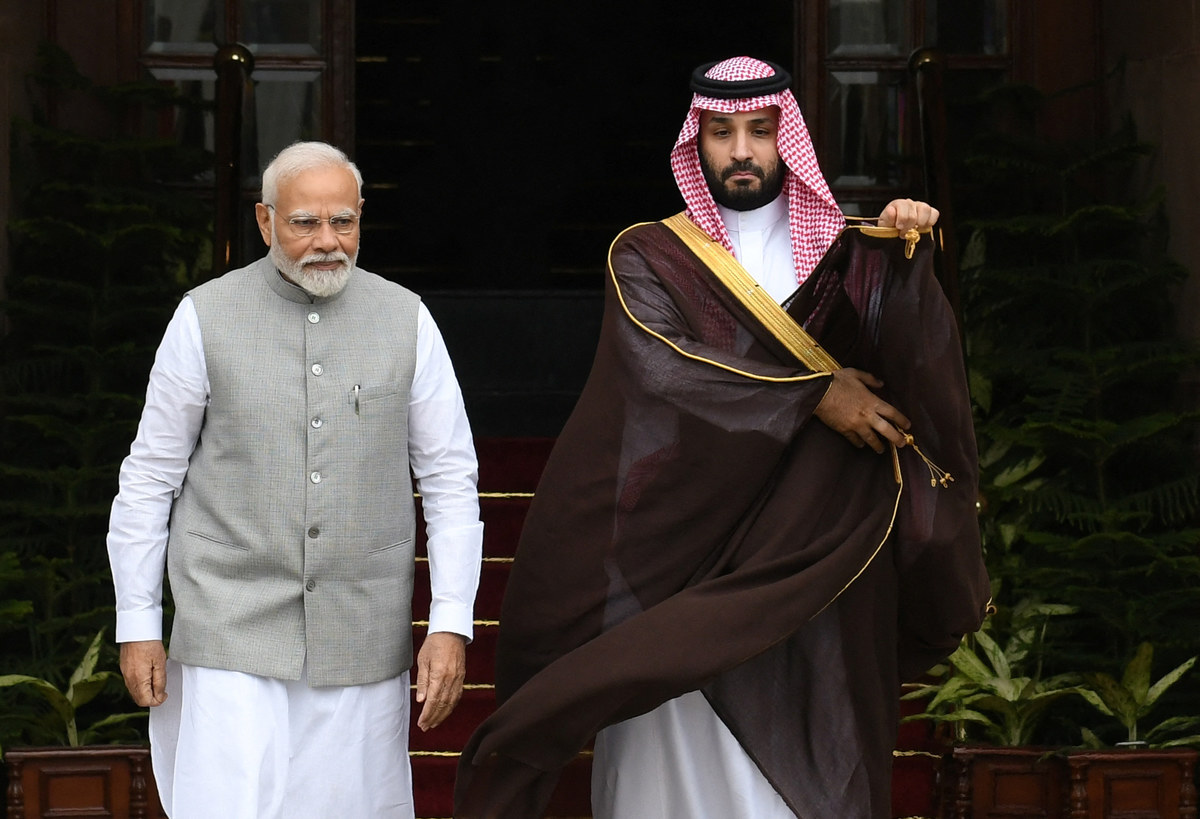
Saudi Arabia’s Crown Prince Mohammed bin Salman and India’s Prime Minister Narendra Modi arrive to attend a photo opportunity ahead of their meeting at Hyderabad House in New Delhi, India, September 11, 2023. (Reuters)
For Muddassir Quamar, associate professor at the Centre for West Asia Studies at Jawaharlal Nehru University in New Delhi, the strengthening of trade ties has come hand in hand with a shared acknowledgment of common strategic aims in the region.
“Both India and Saudi Arabia are leading global economies, which are growing very fast and recognize the importance of economic reforms and prosperity for the people,” Quamar told Arab News.
“Saudi Arabia is a regional power in the Middle East, it is the leading regional economy and plays a very important role in regional politics and stability.
“Some of the recent initiatives undertaken by Saudi Arabia to fight climate change, its mega reforestation drive, in green energy and the world water commission, are significant for regional stability.”
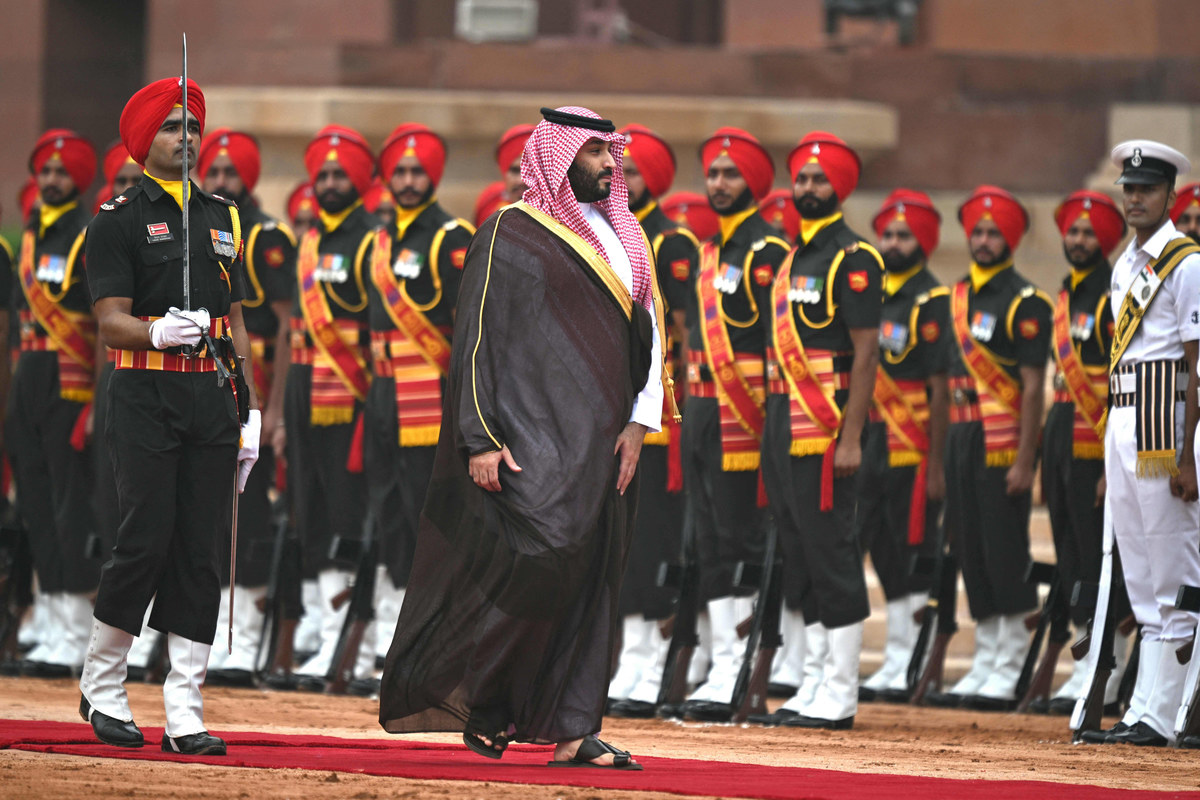
Saudi Arabia’s Crown Prince Mohammed bin Salman (C) inspects a guard of honour during a ceremonial reception at the President House a day after the G20 summit in New Delhi on September 11, 2023. (AFP)
Furthermore, the growth of Saudi-India ties reflects a broader shift toward a multipolar world, in which emerging economies are playing a greater role in determining their own relationships and the power dynamics within their respective neighborhoods.
As India this year becomes the world’s most populous country, and is potentially on track to become the world’s fourth biggest economy, Saudi Arabia and the wider Gulf region have adjusted their policy focus accordingly.
“Several initiatives have been identified to take the relationship to a new level,” said Kumar, the strategic affairs expert.
“In the fast-changing geopolitical profile of the Middle East, India and Saudi Arabia both need each other to balance their relationships for a peaceful and stable West Asia, where more than 8 million people of Indian origin reside and contribute for the betterment of the economy of the region.”
